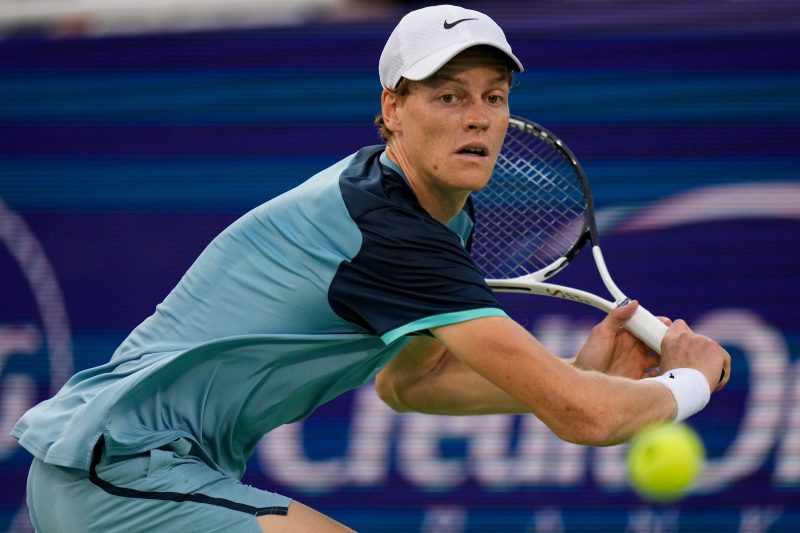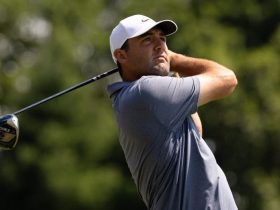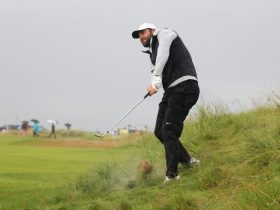The four Grand Slams get bigger and bigger every year, but it’s possible no single event changed the course of the tennis season more than the Paris Olympics.
It wasn’t just that 37-year-old Novak Djokovic finally won the gold medal that had long eluded him, or that women’s No. 1 Iga Swiatek cracked under the pressure of playing for Poland on the same red clay where she’s been untouchable for the past three years.
Any Olympic tournament throws a wrench into the normal rhythm of the tennis season. Already facing a packed 10-month schedule full of big tournaments that wears on the body and mind, those who chose to play the Olympics not only added another high-stress event to their workload but did so with the added hurdle of quickly switching from grass back to clay and then immediately to the North American hard court swing leading up to the US Open.
It’s a small sample size, but the results in Cincinnati and Canada over the last couple weeks suggest that those who played the Olympics came back physically and emotionally drained while those who skipped Paris enter the Open in better form. And then there’s Djokovic, seeking his 25th Grand Slam title, who hasn’t played since a monstrous effort to beat Carlos Alcaraz 7-6, 7-6 in the gold-medal match.
Those dynamics set up a fascinating tournament in New York where it seems like there could be some chaos and early-round upsets. Here are five things to know about the draw, which came out Thursday afternoon in advance of Monday’s opening-round matches.
Coco Gauff’s summer struggles
As hot as Coco Gauff was coming into the US Open a year ago – ultimately delivering her first Grand Slam title – her 2024 campaign has been confusing and underwhelming. Though she got to the semifinals at the Australian and French opens, cruising through against relatively soft draws perhaps masked some underlying issues in her game and her confidence. Ever since getting routed by Emma Navarro in the fourth round at Wimbledon, Gauff has taken early losses to Donna Vekic at the Olympics, Diana Schnaider in Canada and Yulia Putinseva in Cincinnati.
Now she has to find her form while facing the pressure as the defending champion in New York, and the draw didn’t do her a lot of favors. Vavara Gracheva is a tricky first-round match, Elena Svitolina is a tough customer potentially in the third round, and she could have to get through both Navarro and recent Wimbledon champ Barbora Krejcikova just to reach the semis. If Gauff doesn’t win a few rounds, she’s in danger of falling out of the top five. Will the New York vibes inspire her to find her best again or intimidate her?
Doping controversy looms over men’s draw
The news this week that world No. 1 Jannik Sinner twice tested positive for the banned substance clostebol in the spring and had been provisionally suspended for much of the year during the appeal process – only to be cleared of wrongdoing by the International Tennis Integrity Agency – was a shock to the sport.
Almost immediately, several players took to social media claiming that there were double standards and preferential treatment in the way this case was handled, while former Wimbledon finalist Nick Kyrgios said Sinner should be suspended for two years.
Sinner, who won the Australian Open for his first major at the beginning of this season, successfully argued that traces of the steroid entered his system via his personal physiotherapist, who had used a spray containing the drug – which is available over the counter in Italy – to treat a wound on his own hand. The ITIA essentially accepted the claim that Sinner, who had lesions on his body from a skin condition, acquired traces in his system while being treated by the physio without gloves. Still, Sinner was stripped of ranking points and $325,000 in prize money from his semifinal appearance at Indian Wells, where the positive test popped up.
How Sinner processes this news becoming public, and how fans react to him in New York, will be a big storyline to follow as he makes his way through a tough draw that includes potential matchups with American Tommy Paul in the fourth round, Daniil Medvedev in the quarters and Alcaraz in the semis.
Women’s draw could get crazy
The lack of consistency on the women’s side this summer suggests this could be a replay of 2021 when qualifier Emma Raducanu came out of nowhere to beat equally out-of-nowhere Leylah Fernandez in the final.
Gauff doesn’t have it right now. Swiatek, outside of the French Open, has been a bit of a disappointment in majors the last couple years. Elena Rybakina can’t stay healthy. Jessica Pegula, who is in good form right now, has never broken through past a Grand Slam quarterfinal. The only top player who comes in feeling really confident is last year’s finalist Aryna Sabalenka, who rolled to the title in Cincinnati last week but had struggled for a stretch before that.
There’s potential for some real bracket-busting upsets right away: Naomi Osaka against No. 10 seed Jelena Ostapenko, Wimbledon and French Open finalist Jasmine Paolini against 2019 US Open champion Bianca Andreescu, Raducanu against former Aussie Open champ Sofia Kenin and Olympic gold medalist Zheng Qinwen against recent Canada finalist Amanda Anisimova. If you like upsets, the first couple rounds here could deliver in a big way and reshape the entire complexion of the tournament.
How will Novak Djokovic and Carlos Alcaraz bounce back emotionally?
Djokovic has been basking in Olympic glory for a few weeks, with multiple celebrations in Serbia. But how hard has he been working physically – and, frankly – how much does he really care about this US Open after fulfilling the last major goal of his incredible career?
He might need to be sharp early on, as big-serving Jan-Lennard Struff is no gimme in the second round and potential third-round opponent Alexei Popyrin has played Djokovic tough multiple times in the past and is full of confidence after winning a surprise title in Canada. A potential fourth-round matchup against an American – either No. 13 seed Ben Shelton or No. 20 seed Francis Tiafoe, who seems to have rediscovered some form lately – looms as a tantalizing test.
Alcaraz, meanwhile, returned in Cincinnati after his bitterly disappointing Olympic loss and played what he called the worst match of his career in losing to 37-year-old Gael Monfils right out of the chute.
Was that just a fluke? Was he rusty after a post-Olympic vacation? Or has the emotional toll of winning the French and Wimbledon, followed by the Olympics, taken too much out of him as the season winds down? Alcaraz could also be tested early in New York by Denis Shapovalov in the second round, rising Brit Jack Draper in the third and American Sebastian Korda in the fourth.
Are Djokovic and Alcaraz on another collision course for the final, or will they be victims of a long and grueling season, throwing the men’s draw into chaos?
Remember this name: Learner Tien
Though American men are likely going to complete a 21st consecutive year without winning a Grand Slam singles title, the top-50 rankings these days are loaded with good players representing the Stars and Stripes. And we could be introduced to another one next week: 18-year-old Learner Tien from Irvine, California.
The son of Vietnamese immigrants, Tien reached two junior Grand Slam finals and won the USTA Boys’ 18-year-old national championship when he was just 16. Since turning pro, he’s made progress up the rankings, winning some low-level ITF tournaments and a Challenger Tour title in July. At the ATP level, he’s currently in the quarters of the Winston-Salem Open, notching wins against No. 49 Fabian Marozsan and No. 69 Thiago Seyboth Wild.
Tien, playing the US Open as a wildcard, drew 24th-ranked Frenchman Arthur Fils, another rising youngster. That’s a first-round match to keep an eye on. And if Tien can advance, he might have a pathway to make a little bit of a run and become something of a household name in the tennis world.
Follow Dan Wolken on social media @DanWolken






